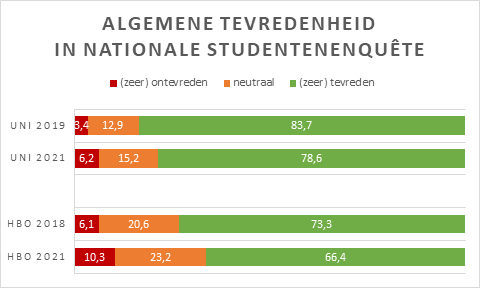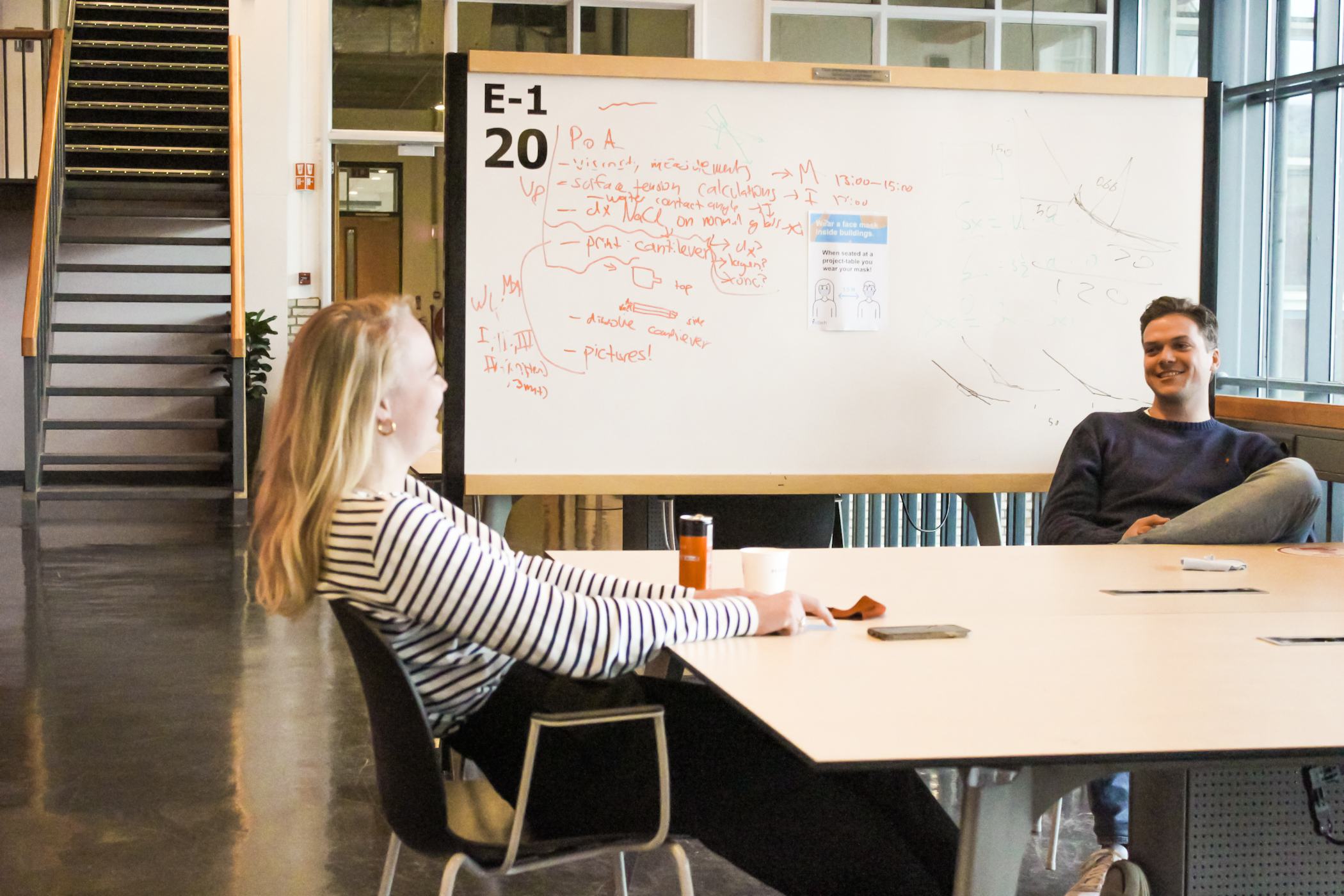How satisfied are students with their educational experience? Given the corona crisis, less satisfied than before, according to the National Student Survey.
TU students are generally satisfied with their educational experience, according to the National Student Survey 2021. (Photo: Dalia Madi)
When the coronavirus crisis broke out last year it put paid to the National Student Survey: students weren’t given a chance to evaluate their study programmes, facilities, lecturers or their overall educational experience.
The year before there were technical problems with the survey. At the time, the universities of applied sciences pulled out in annoyance. Thus, the most recent student evaluations available for higher professional education were from three years ago.
 © HOP. Source: NSE 2021, 2019 en 2018.
© HOP. Source: NSE 2021, 2019 en 2018.Decline
In the interim period, it looks like student satisfaction has significantly declined. Asked to evaluate their educational experience ‘overall’, 78.6 percent of university students said they were satisfied or very satisfied. Two years ago the figure was 84 percent.
In higher professional education the situation is somewhat worse. Only 66.4 percent are satisfied or very satisfied. In 2018 that figure was 73 percent. In the current poll, one in ten students in higher professional education said they were unsatisfied or very unsatisfied. Previously that figure was just six percent.
According to the Studiekeuze123 Foundation, who conducted the poll, you shouldn’t really make this comparison. A new list of questions was used this time so that “straightforward comparisons” with prior years are not really possible.
But the survey still uses a scale of 1 to 5 for very satisfied to very unsatisfied, and the first question still asks for an evaluation of the overall educational experience. Little has changed in that regard, despite the more concise formulation of questions.
Damage?
Therefore, the shift is noteworthy. Taking into consideration the coronavirus crisis, you might say: it’s not so bad, it’s great that higher education has managed to limit the damage. Or you could say: look at how deeply the coronavirus crisis has affected students.
Studiekeuze123 does neither one nor the other. The tone of the press release is dominated by enthusiasm based on the high numbers of students who are satisfied with their study programmes: still over 70 percent for higher professional education and university education together, and that’s without including a pretty large portion who are neutral.
Studiekeuze123 is an independent organisation, but has been tasked with the survey by the Ministry of Education. They are also instructed to approach the sector for input. The press release has been approved by an advisory committee representing universities and universities of applied sciences, a spokesperson says.
TU Delft
Asked to evaluate their degree programme ‘overall’, 77 percent of TU Delft students are satisfied or very satisfied. On the five-point scale, two Bachelor’s programmes even score more than four points: clinical technology (4.02) and nanobiology (4.04). The Technical Computer Science bachelor’s programme got the ‘least’ result with 3.61 points.
On the same component, computer engineering as a master’s programme achieves the lowest score (3.54). Five master’s programmes score four or more points: technical medicine (4), science education and communication (4.08) marine technology (4.11), life science and technology (4.11). The berlage post-master in architecture and urban design is at the top of the list (4.22).
The marine technology programme stands out in this list. In the recently published Keuzegids, this master’s programme came off badly with six unsatisfactory marks. Since the last NSS survey in 2019, on which the Keuzegids is partly based, the programme has made a number of changes. For example, students were given more freedom to specialise in the direction of their interest and a number of personnel changes were implemented.
“My colleagues and I welcome this wonderful news,” says Director of Education Peter de Vos. “We are very pleased that the results are now more in line with our own expectations and ambition.”
Studiekeuze123
The results of the NSS are used on the eponymous website Studiekeuze123, where prospective students can compare different study programmes. The magazine Elsevier and various programme selection guides for higher education also make use of the data.
HOP, Bas Belleman
Translation: Taalcentrum-VU
Do you have a question or comment about this article?
redactie@hogeronderwijspersbureau.nl


Comments are closed.